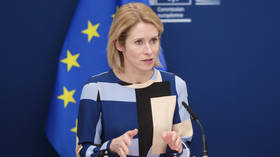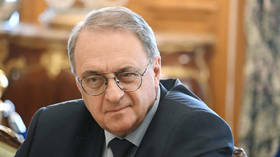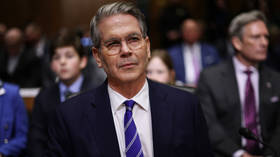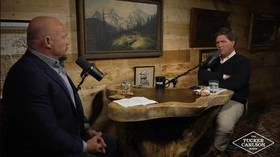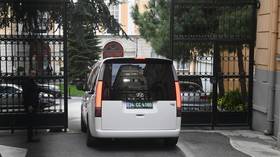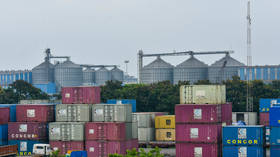US sanctions relief possible for Iran in the future
Ahead of a possible meeting between the US and Iran, the two nations are moving in a new direction. As their relationship changes and trust builds, the US might approve sanctions relief, editor-at-large of Atlantic magazine, Steven Clemons, told RT.
The trust building process between Iran and the US “ultimately will lead to some sanctions relief, but I think Washington wants to see some harder commitments on processing, both inspection and verification, and on a deal of what could be achieved in moving Iran to a lower kind of processing capacity than it has today,” Clemons said.
RT:What do you expect from the meeting between US President Barack Obama and Iranian President Hassan Rouhani , if it happens of course?
Steven Clemons: I think there are hardliners in Iran and hardliners in Washington that are very mistrustful of each side. And we've been here before with President Khatami and Bill Clinton. They both tried very hard to bring along their governments and they tried to think along the normalization track. The environment is different. Today there is sense in the US that the sanctions and the tough elbows against Iran have created some benefits and there are reasons domestically inside Iran where Iran might finally, after many decades, want to move into a different arena. So if the presidents actually meet, it's hugely significant but it doesn't deliver the final deal. There’s going to be a lot of work, a lot of trust building. I think we have a long way to go. Of course the most important person in this is the supreme leader in Iran who is not a visible and transparent person, Ayatolla Khamenei, who does ultimately control the course and direction of the government more than Rouhani does. But nonetheless, these are promising steps. I think the appointment of Javad Zareef is extremely important, many of us know him. And he was put in the dog house when Mahmoud Ahmadinejad was president, and the fact that he has been resurrected - brought back and elevated to this position - is a sign that something is different in Tehran's calculations about Washington today.
RT:Do you think the US will back down in its opposition against Iran's nuclear programme now that Rouhani has stated it is peaceful?
SC: It'll be dependent upon trust building and inspections. I attended the same kind of dinner years ago with former President Hotami in the home of Javad Zareef, the current foreign minister. Hotami put on the table a proposal that said, ‘we'll make inspections - invasive inspections by UN inspectors - the law of our land if you allow us peaceful processing, small-level research, and development capacities.’ That was about five years ago. We lost five years since then. And now if you listen to President Obama's language, he's essentially saying that's our target, that's our goal. So we've had five years of animosity and five years in which thousands of other centrifuges have been created and deployed. So it's going to be harder to get back there. But nonetheless it's promising that Obama is taking a posture that something can be allowable, and he's creating a language opening. It's very different than the kind of language that Benjamin Netanjahu would like Obama to say - that by force we are forcing Iran to give up all processing capacity whatsoever. So I think this is a very significant shift in this case.
RT:Do you think Iran will convince the US to reconsider its policy of sanctions?
SC: I don't think you'll see any easing in the near term, because there's sense that the sanctions, that the things that are in place, have driven Iran to this point. You may have some trust building steps that Iran initiates something and that the US does something and then in the second round you could see some symbolic shifting of sanctions. And that's part of what you were just mentioning with some prisoners' releases, that this may be part of trust building process. Ultimately it will lead to some sanctions relief, but I think Washington wants to see some harder commitments on processing, both inspection and verification, and on a deal of what could be achieved in moving Iran to a lower kind of processing capacity than it has today.
RT:Many hope relations will improve - but the US has announced plans to seize an Iranian building in New York because it allegedly breached sanctions - what do you make of the timing?
SC: I guess one of the things about what may happen with this property and the potential violation of the sanctions is on a separate track from a potentially interesting diplomatic track. The timing is bad but I don't think the issue of the New York building will be definitive in any way or derail the enthusiasm and real interest and curiosity in Rouhani, who will be meeting with a great number of Americans at a number of dinners which the Iranian embassy in New York will be hosting. While it looks significant, I think it actually is not.
The statements, views and opinions expressed in this column are solely those of the author and do not necessarily represent those of RT.




